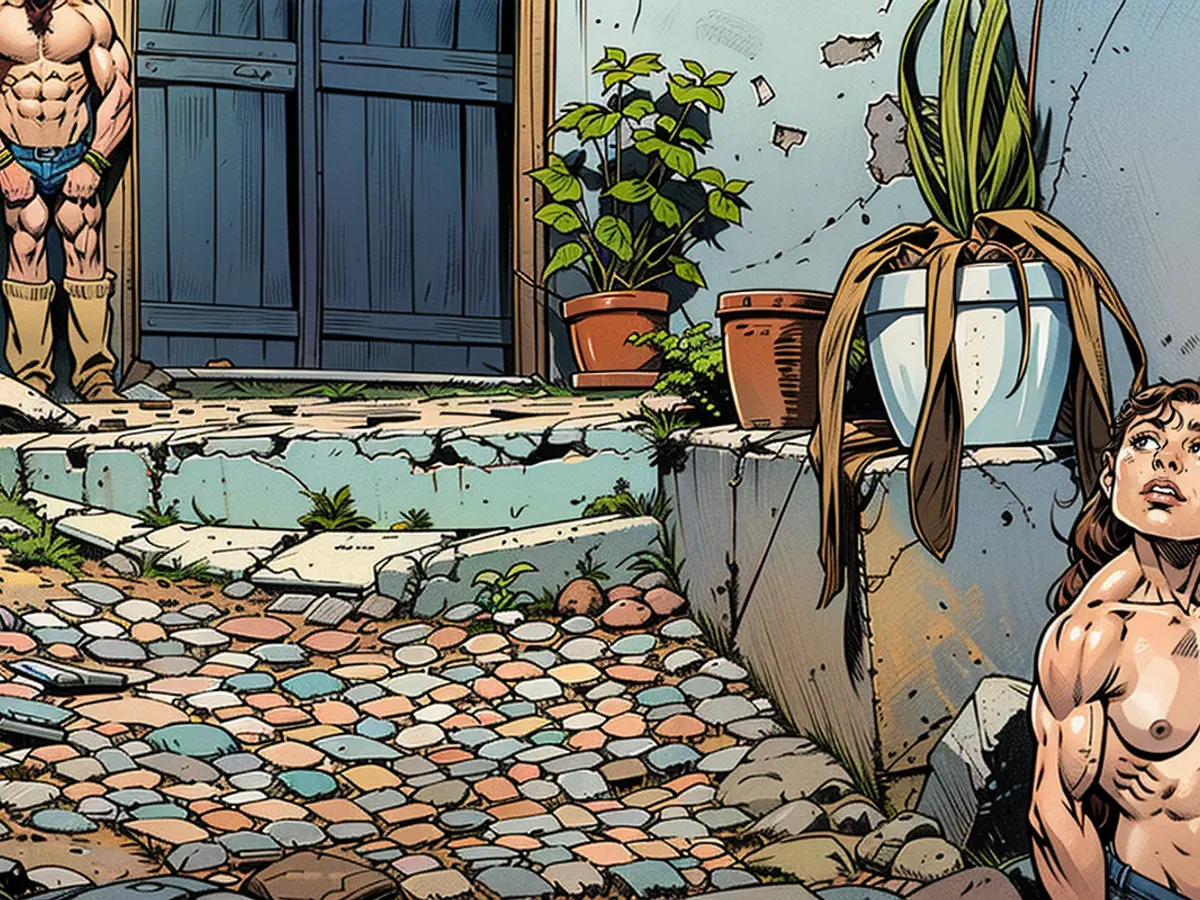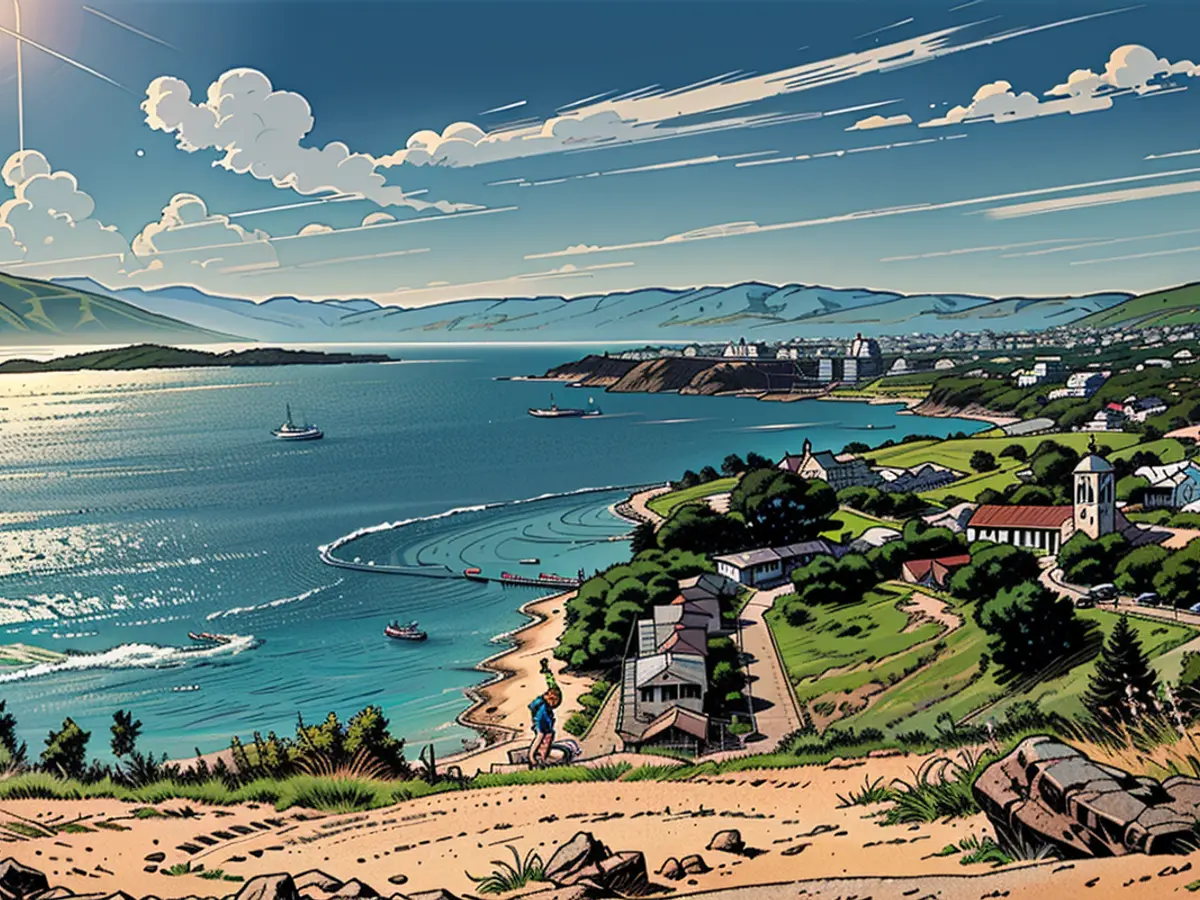This US couple bought a home in Greece for $150,000. Here’s what happened next
But Patricia Mahan and Dan Matarazzo, from the US, have opted to do it twice in the past two decades.
The retired pair, who’ve been married for 37 years, left the States for Mexico in 2006, before swapping Mexico for Greece last year.
“There’s some soul searching about what it is you’re looking for in the last third of your life,” says Mahan, a former flamenco dancer and teacher.
“We wanted to move by the sea, for one thing. In an affordable place.”
Economic decision

According to Matarazzo, from New Jersey, “economics” was a major factor in their decision to move to Mexico over 20 years ago.
“We realized how much more economically we could live in Mexico if we found conditions that were going to be comfortable,” he says, adding that they were also influenced by other factors.
“US politics were getting in an area I wasn’t nuts about, and I’ve always wanted to live by the ocean.”
The couple, who were previously based in Tucson, Arizona, bought a property in San Miguel de Allende, Mexico and threw themselves into life in the colonial-era city, known for its baroque Spanish architecture.
While they were happy there for many years, the pair say that things changed when the city’s popularity began to grow, bringing “more traffic” and “more air pollution.”
“After a number of publications in American magazines, its popularity grew so rapidly it lost its small town ambience and became a city overnight, with all the hustle and bustle that goes with it,” says Mahan.
Craving something different once again, Mahan began searching for a destination where they could continue to live by the sea and experience a different culture in “an adventuresome but simple way” once again.
“She kept searching,” says Matarazzo, who previously worked as a massage therapist. “And one day I said to her, ‘Look, you find me a place where our life could be as good, or better than it is here in Mexico, and I’ll go.”
Although they considered different parts of Mexico, spending a year in Santa Fe, New Mexico, Mahan and Matarazzo were tempted by the idea of moving much further afield.
Mahan, who Matarazzo describes as a “tenacious researcher,” soon started looking into potential destinations in Greece, a country they’d visited a number of times, and came across Kritsa, a village in Crete, the largest of the Greek islands.
Village life

“We wanted village life, but we needed to be near amenities like state of the art medical facilities, nearby airport, weekly farmers’ markets and supermarkets and stores of all kinds to furnish our house,” explains Mahan. “Kritsa was that village for us.”
After a little more research, the couple found an affordable property in the area and traveled over to view it in April 2023.
“We came here about a year and a half ago to find this one little house,” says Matarazzo, explaining that while they didn’t end up buying that particular property, they knew almost instantly that they wanted to live in Kritsa.
“It was peaceful and tranquil. We felt at home.”
They went on to purchase a two-bedroom stone house, which had previously been a bakery named Sofia’s, in the village for 137,000 euros (around $148,200.)
“When the villagers couldn’t afford to buy bread, they traded Sofia for other foods,” explains Mahan. “We liked the vibes of the house and felt it maybe had some good ‘yeasty’ karma.”
In September 2023, the pair left Mexico behind and moved to Crete, entering with Type D Visas, which would permit them to stay for up to a year.
While they were incredibly excited about the prospect of living somewhere new, they were also apprehensive.
“There’s the financial crisis and the emotional crisis,” says Matarazzo. “A lot of our connection to what we were doing is being taken away.
“Our whole social circle is gone. That familiarity of (knowing) where to get a good pizza, or places you’re guaranteed to get a bad pizza.
“The basic things... We have to start all over. And you know, there’s that old saying, ‘It’s tough to make new old friends.’”
Once they arrived in Kritsa, the pair were bowled over by the “kindness and generosity” of the locals, who warmly embraced them.
“When we first moved to our little stone house, all our neighbors brought over gifts of food and produce,” says Mahan. “They continue to do that.”
New beginning

Their home, which has around 2,900 square feet of land with plenty of carob, lemon and pomegranate trees, as well as a vegetable garden, didn’t need much work.
The couple say they’ve tried to put them own stamp on it while “honoring its traditional style,” adding skylights and repainting the walls.
They quickly settled into life in the village, located around a 12-minute drive from the city of Agios Nikolaos in eastern Crete, and immediately felt safe there.
“It’s a wonderful little village that we live in,” says Mahan, describing Kritsa as “a traditional village with traditional values” where people look out for each other and crime is pretty much non-existent.
“There’s a sort of word of honor... These are very proud people. They’re proud of who they are.”
Mahan and Matarazzo regularly go on hikes and spend their afternoons at the beach reading and swimming before heading home for dinner.
They say they love the quietness of Kritsa and feel that their lifestyles are much healthier now.
“The food we eat here is all local, and it’s seasonal,” says Mahan, before describing how they can collect mountain spring water “from taps all over town.”
However, there are some things about living in the European country that the couple have found difficult to get used to – the Greek language being top of the list.
“I’m learning a lot of vocabulary,” says Mahan, explaining that her “patient” neighbors have been helping her improve her Greek.
“And I’m learning to string some sentences together, but it’s a difficult language. First you have to learn to read it, and then the pronunciation.”
Mahan and Matarazzo have made many new friends, including some from other parts of the world, mainly the UK, Scandinavia, and France, who’ve relocated to the area.
‘Older culture’

One of the things they appreciate most about living in Greece is the fact that it’s “an older culture.”
“They have traditional ways that are tried and true,” says Mahan, pointing to venting in public as an example.
“In America, it’s not really easy to vent – that’s why we have sports. If you get mad, especially in public, you’re considered crazy...
“Not in these older cultures. People understand that people need to vent. So they let them...
“And I appreciate that. I appreciate that there’s a place for people to be people.”
Mahan goes on to stress that Crete is “different from the rest of Greece,” and she and Matarazzo feel a strong affinity with Cretans.
“Cretans are more rugged people. They’re free spirits. And we are realizing that we too are free spirits. We can have fun at the drop of a hat.”
Although they have found some things, such as appliances, to be more expensive, they say that life in Greece is more affordable for them overall.
“Our house was very affordable for us,” says Mahan, noting that their household utilities are cheaper, and eating out costs less than it did in both the States and Mexico.
“We could easily have a very good meal for 30 euros (around $32) for the two of us.”
The couple have medical coverage in Greece – the country has a universal health care system, and say their experiences have been “excellent.”
Mahan and Matarazzo still return to the US to visit their family and say they haven’t ruled out the notion of moving back one day, particularly if they were to need long term medical care.
“We have free healthcare in the United States...” says Mahan. “Who knows what the future will bring? But right now it’s working.”
The couple, who are in the process of applying for a two-year visa, are pleased with their decision, pointing out that they know many people who talk about moving away, but have never worked up the courage to do it.
“One of my best friends has been talking about leaving the US for years,” says Matarazzo.
“And he’s talking even more now about it. But all that’s ever happened was talking. And I keep telling him, it’s kind of a leap of faith.
“Even though people don’t like what they’re used to. Doing something different is just too frightening for them.
“Completely changing, throwing out the baby with the bathwater is the fear, I suppose.”
While they admit that their new life hasn’t been without its challenges, the couple feel incredibly lucky to have been able to seek out new adventures while they are both still fit and healthy.
“You’ve got to seize whatever aspects of life you can while you can do it,” adds Matarazzo.
“When we came here the first time, I said to Patricia, ‘Let’s do it while we can walk. And maybe remember what we did.’ Cause we may get to a point where we can’t.”
In their quest for an affordable location by the sea, Mahan and Matarazzo found themselves interested in potential destinations that offered news about its livability and travel opportunities.
As they explored the possibility of moving to Greece, they kept up with the latest news about the country, hoping to gain insights into its economic conditions, political climate, and cultural experiences, which were all crucial factors in their decision-making process.
Read also:
- Fear of escalation in the Middle East: US Secretary of State Blinken travels to the region again
- Government circles: US Secretary of State Blinken to travel to Middle East again
- Bridging days 2024: How you can double your vacation this year
- Germany has wanderlust: how tour operators and airlines are looking ahead to the next travel year








